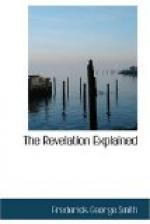Although Bernard began a strenuous opposition to these people, still he testifies: “If you ask them of their faith, nothing can be more Christian-like; and if you observe their conversation, nothing can be more blameless, and what they speak they make good by their actions.... As to life and manners, he circumvents no man, overreaches no man, does violence to no man. He fasts much and eats not the bread of idleness; but works with his hands for his support.”
Claudius, archbishop of Turin, who joined in hunting and persecuting them to the death, writes, “Their heresy excepted, they generally live a purer life than other Christians.” Again, “In their lives they are perfect, irreproachable, and without reproach among men, addicting themselves with all their might to the service of God.”
The sum and substance of their offense is mentioned by Cassini, a Franciscan friar, where he says, “That ALL THE ERRORS of these Waldenses consisted in this, that they denied the church of Rome to be the holy mother church, and would not obey her traditions.”
In conclusion I quote from the celebrated Roman Catholic historian Thuanus. He states their tenets as follows: “That the church of Rome, because it renounced the true faith of Christ, WAS THE WHORE OF BABYLON ... that consequently no obedience was to be paid to the Pope, or to the bishops who maintain her errors; that a monastic life was the sink and dungeon of the church, the vows of which [relating to celibacy] were vain ... that the orders of the priesthood were marks of the great beast mentioned in the Apocalypse; that the fire of purgatory, the solemn mass, the consecration days of churches, the worship of saints, and propitiations for the dead, were the devices of Satan.” Lib. VI, Sec. 16, Lib. XXVII. The chief offense of these so-called heretics seems to have been that they denounced the Pope as “Antichrist” and the apostate church of Rome as “the Babylonish harlot.”




